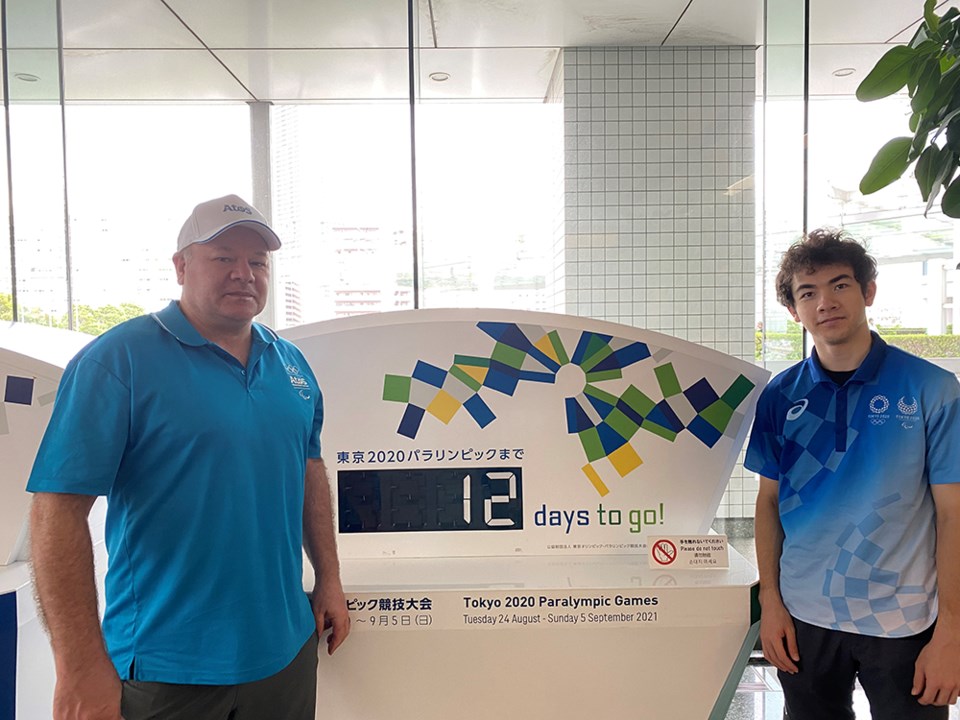A former Powell River resident is a connection between this community and the Olympic and Paralympic Games Tokyo 2020.
Brent Carlson left Canada a month after graduation from University of Victoria in 1989 for Tokyo, where he has lived ever since.
He is one of approximately 30 local hires for Atos, a French multinational information technology service and consulting enterprise founded in 1997 and headquartered in Bezons, France. One of the largest IT companies in Europe, it is the worldwide IT partner for the International Olympic Committee.
Carlson is one of three service desk managers in the technology functional area on each shift during the Olympic and Paralympic Games. They provide support to the service desks at all the venues as well as the Technology Call Centre.
“There’s a very good atmosphere among the people we work with,” said Carlson. “A number of them go from Summer Games to Summer Games, and transfer their skills and experience to the organizing committee and local hires, most of them first-timers. It’s a very big project and they’re very patient with us.”
Carlson found the scale of the ramp up to be the most challenging part of his position as it got closer to Games time. Because of COVID-19, there was a pause and they were actually delayed for a year amid concerns about holding them at all. Test events in Tokyo, both national and international, were very important for the host city with some of the competitions serving as qualifying events.
The workload in providing services moves from hundreds to thousands of people.
“It’s unique compared to the ebb and flow of typical company structures,” said Carlson. “You prepare and prepare as best you can as a first-timer.”
In addition to the competition venues, services and support are provided to many noncompetitive venues such as the International Broadcast Centre, Main Press Centre, Olympic Village and smaller villages outside Tokyo, the two main international airports, and the Uniform and Accreditation Centre.
Carlson’s son Leon volunteered at the press centre and was the main help team leader. He provided general support for journalists and photographers.
“It was a really good experience for me to use my communication skills,” explained Leon. “Because of their jobs, they were very good at asking questions to get what they want.”
He was surprised to learn he was adept at handling questions and complaints, and was able quickly adapt to changes.
“Correct responses yesterday would change today,” added Leon. “I was able to keep up with all the new information.”
The Olympic Games are a unique project that starts out years in advance and the busyness changes the closer it gets to Games time.
“You have thousands of people joining in, some needing training and others access to data,” explained Brent.
According to Brent, the best thing about his job was training people how to use a particular tool to log and track trouble incidents and to have policies and procedures in place to resolve those issues before they interrupt services to thousands of users.
Because of his early background in teacher training programs and then his work with technology over the years, he could help people become trained quickly and competently, and able to provide solutions to issues that arise.
Athletes come first
“First and foremost we’re always thinking about the athletes so they can look at their results quickly and trust the accuracy,” said Brent. “Then for the people around the Games, coaches, and staff, and then for people watching everywhere around the world so that in the end they all have a good experience.”
Brent said the actual Games themselves were “pleasantly smooth and calm” because of all the preparation.
“That’s what you want to happen,” he added. “The Games are on and then boom, it’s done.”
Currently, Tokyo is in transition to the Paralympic Games, which start August 24 and run to September 5, 2021.
With fewer events, hours are different for Brent and the rest of the Atos team.
Reflecting on his experience so far, he said, “I’ve been a sports enthusiast all my life, so it was great to be involved with the biggest sports event in the world.
“As a Canadian, I was unable to attend the Winter Olympic and Paralympic Games in Vancouver 2010. I was happy to be involved with these Games in my adopted country.”
The next Summer Olympic Games are scheduled for 2024 in Paris.
“Everybody in the Atos company is excited to support the Games in their home country,” said Brent. “My counterpart has been preparing in France for the past year already.”
Like every Olympic Games, there is concern and opposition leading up to them.
“When the competitions start, the focus is all on the athletes and their performances,” added Brent. “It’s all about their stories and backgrounds and that’s how it should be.”



